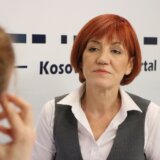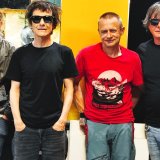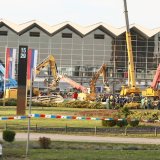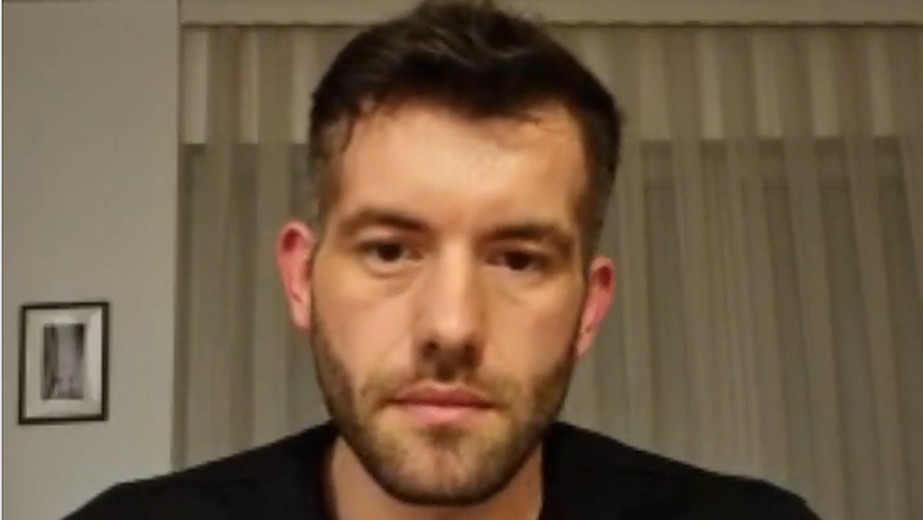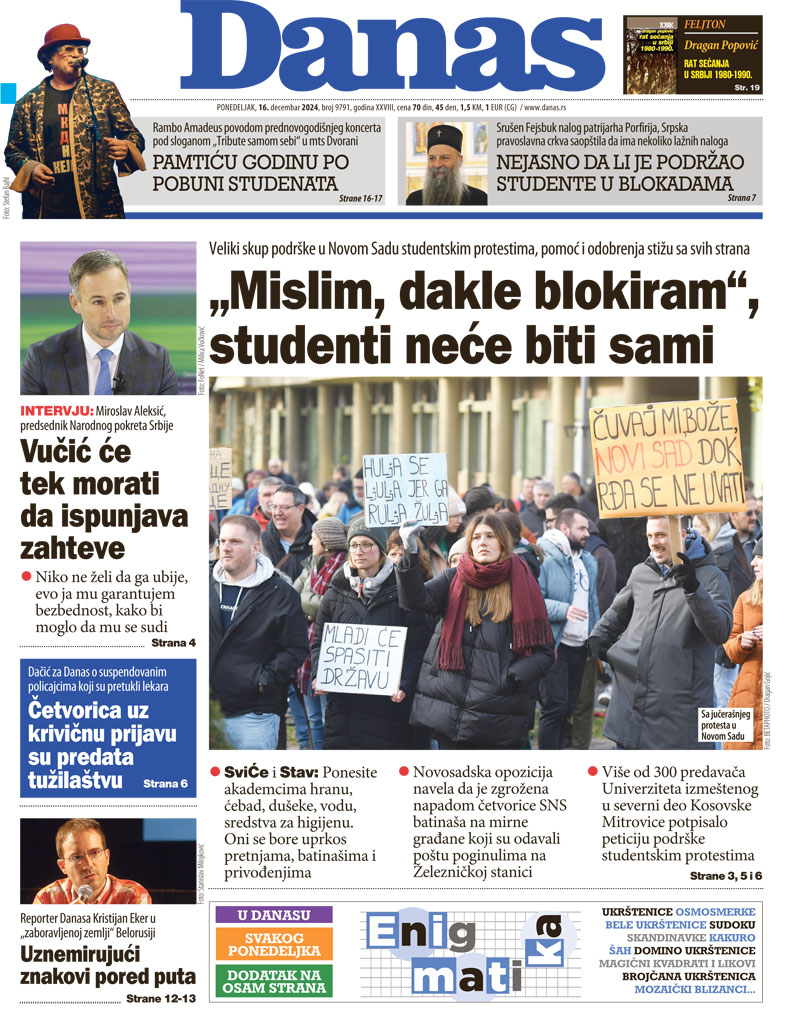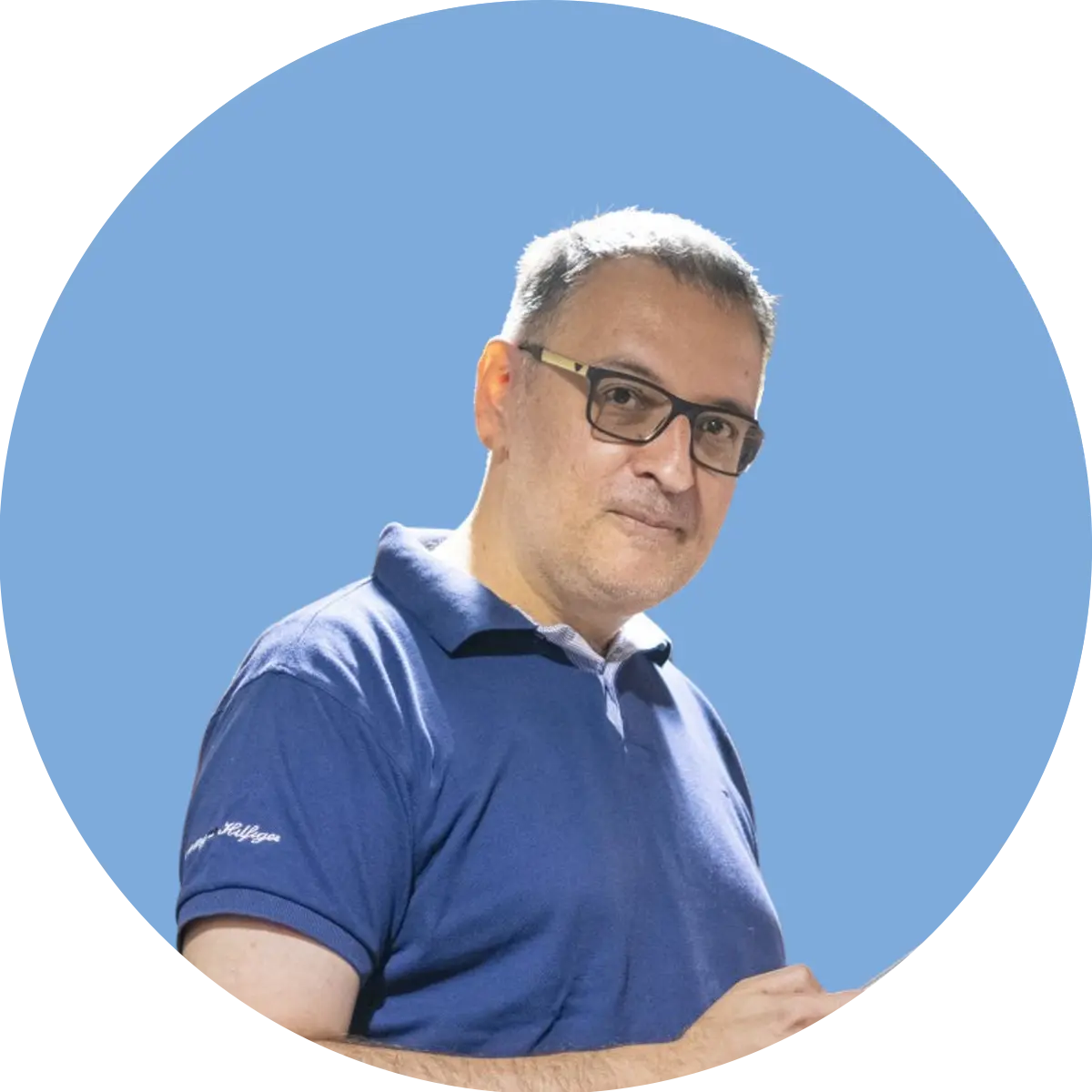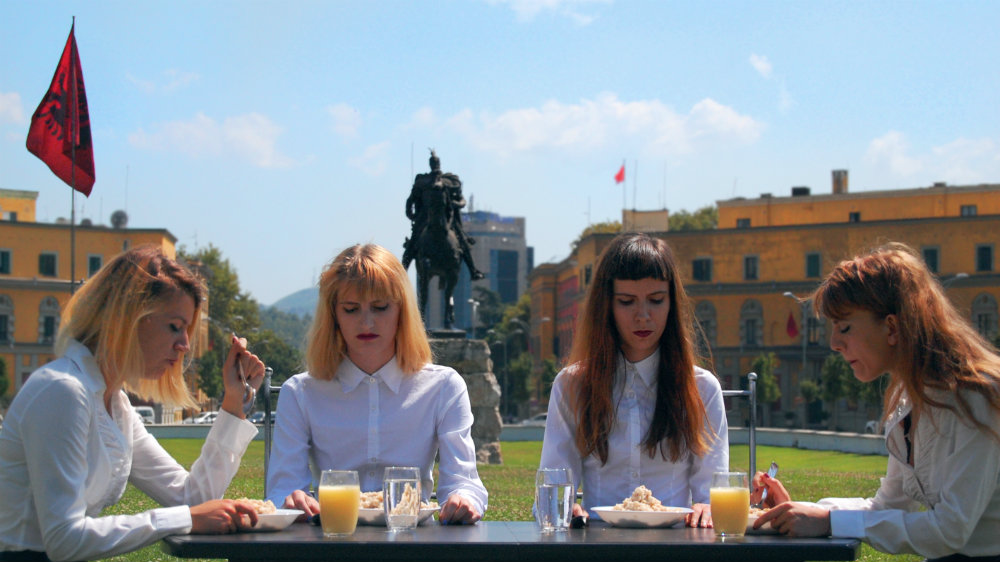 Foto: Xheni Alushi
Foto: Xheni Alushi Genocid se odvio pre 20 godina na Kosovu. I dalje se 1.652 ljudi vodi kao nestalo, a silovanje je korišćeno kao oružje rata.
Sa okupacijom Kosova, tokom devedesetih godina, došlo je do pokušaja da se uništi čitava jedna generacija, a ljudi na Kosovu i dalje trpe posledice, ističu dva para sestara, Vesa i Hana, Lola i Alketa, koje čine organizaciju Have It.
Okupile su se 2011. godine i do sada izvele brojne društveno angažovane performanse, bile autorke video instalacija i bilbord kampanja. Prošle godine osvojile su nagradu za demokratiju (KCSF).
Na umetnost ih inspiriše svakodnevni život, imaju srpske prijatelje i zalažu se za borbu protiv diskriminacije i represivne pravne strukture koje deluju kroz patrijarhalne norme. Rešavanje sukoba vide u dolasku nove progresivne generacije.
Njih četiri su u okviru projekta Druga strana Kosova dale intervju za Danas, u kome su odgovarale i na pitanja Sonje Biserko, predsednice Helsinškog odbora za ljudska prava u Srbiji, ali i na pitanja sa društvenih mreža.
Projekat „Druga strana Kosova“ ima za cilj da približi kosovskoj i srpskoj javnost informacije koje nisu plasirale političke elite, ni s jedne strane, već nezavisni građani i ima za cilj povezivanje kosovske i srpske kulturne scene koja je nedovoljno zastupljena u medijima.
- Pitanja novinara Danasa
Šta bi, prema vašem mišljenju, trebalo najpre i prioritetno učiniti kako bi se odnosi Srbije i Kosova normalizovali?
– Ne može biti bilo kakve normalizacije odnosa sa Srbijom bez sistematskog razmatranja onoga što se desilo u prošlosti. Prvenstveno Srbija treba da uputi izvinjenje, ali i da sprovede i druge politike koje će ljudima na Kosovu da daju do znanja da je Srbija spremna da preuzme institucionalnu i kolektivnu odgovornost. Genocid se odvio pre 20 godina na Kosovu. I dalje se 1.652 ljudi vodi kao nestalo, a silovanje je korišćeno kao oružje rata. Sa okupacijom Kosova, tokom devedesetih godina, došlo je do pokušaja da se uništi čitava jedna generacija, a ljudi na Kosovu i dalje trpe posledice. Moramo to uzeti u obzir. Da bi došlo do generalnog razumevanja mora dosta posla da se obavi. Tek priznanjem i jasnom namerom da se krene napred mogu se uspostaviti normalni bilateralni odnosi.
Kako ocenjujete proces normalizacije koji trenutno vode vlasti u Prištini i Beogradu?
– Smatramo da definitivno još toga treba da se učini u procesu normalizacije. Prvo i najvažnije treba da bude priznanje trenutne realnosti i proglašenja nezavisnosti Kosova iz 2008. godine. To bi osnažilo i albansku i srpsku zajednicu da krenu napred i da se osvrnu na zajednička pitanja sa kojima se suočavaju. Ipak, čini nam se da se u ovom trenutku taj proces odvija preko službi i institucija, a potrebe ljudi nisu pravilno zastupljene.
Da li je moguće da proces normalizacije odnosa Kosova i Srbije okončaju političke elite koje su bile aktivne tokom sukoba devedesetih godina?
– Odgovor na ovo pitanje ne može se primeniti na isti način za Kosovo i Srbiju. Političke elite tokom devedesetih na Kosovu su aktivno pokušavale da se bore za slobodu. Mora da postoji jasna razlika između tlačitelja i potlačenih kada se postavljaju ta pitanja, ako se traži jasan odgovor. Rat se nije odvijao između dva jednaka protivnika. Srbija je koristila čitavu državnu aparaturu u Jugoslaviji za napad, dok su se ljudi na Kosovu borili protiv okupacije. Kao takvi, oni zaslužuju različite odgovore.
Takođe smatramo da je potrebno navesti imena. Ako se ovo pitanje odnosi na dijalog koji vode predsednici obe zemlje, onda se mora napomenuti da je tokom devedesetih predsednik Hašim Tači bio borac za slobodu, dok je Aleksandar Vučić radio pod Miloševićem. Dakle, političke elite Srbije tokom devedesetih godina, koje su danas na vlasti, odgovorne su za uništavanje samog načina života na Kosovu. Oni nemaju dovoljno legitimiteta da sprovedu ovaj proces.
Potrebna je nova progresivna generacija. U ovom slučaju, političke elite na Kosovu ipak pate i od drugih pitanja koja nisu dovoljno predstavljena u ovom procesu. Ali da odgovorimo na vaše pitanje: ne vidimo njihovu ulogu tokom devedesetih kao problem u cilju postizanja bilo kakvog oblika normalizacije između Kosova i Srbije.
Koji su sadržaji vaših nastupa?
– Umetnički reagujemo na probleme našeg društva. Uradili smo brojne performanse o različitim temama, tako da su naši nastupi povezani sa pitanjima na Kosovu kao što su: nasilje u porodici, silovane osobe tokom rata, homofobija.
Kojim se kritičkim pitanjima bavite i za šta se zalažete?
– Bavimo se kritikom nasilja u porodici, diskriminacije. Ženska prava, LGBTQI prava, rodni identitet samo su neke od tema kojima se bavimo. Dovodimo u pitanje različite fluidne oblike ugnjetavanja kao i represivne pravne strukture koje deluju kroz patrijarhalne norme. Mora se napomenuti da na Kosovu postoji živahan umetnički i kulturni život koji se bavi kritičnim pitanjima i gde se ljudi mogu okupiti na mestima kao što su Hapesira Motrat, Stacion – Centar za savremenu umetnost Priština, Kino Armata, Termokiss.
Obeležen je Dan žena, kakav je status ženskih prava na Kosovu?
– Stvari se polako menjaju, ali dobro je da se menjaju. Svake godine postajemo sve jači i češće podižemo glas i nadamo se da ćemo stići tamo. Prošle sedmice ubica supruge (Valbona Nrecaj) i kćerke je dobio doživotnu kaznu zatvora. Mislimo da život žena počinje da se ozbiljno shvata.
- Pitanja Sonje Biserko, predsednice Helsinškog odbora za ljudska prava u Srbiji:
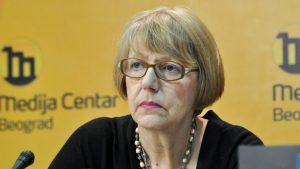
Kako društvo reaguje na vaše aktivnosti?
– To zavisi od sadržaja teme kojom se bavimo. Oni koji imaju veze sa socijalnim problemima kao što su nestašice vode ili nasilje u porodici podržava većina ljudi, ali kada radimo predstave o LGBTQI problemima, dobijamo mnogo negativnih komentara. Zbog performansa sa poljupcem koji smo izveli za Dan zaljubljenih primili smo više od stotinu pretnji od različitih ljudi koje je ova slika razdražila.
Da li država podržava vaše aktivnosti?
– Ne, ne podržava ih. Zapravo, nikada nismo aplicirali za bilo kakvu vrstu podrške, možda bismo i dobili.
Da li su i žene iz srpske za zajednice uključene u vaše programe?
– Have It se sastoji od dva para sestara koje čine Vesa i Hana, Lola i Alketa. Funkcionišemo kao umetnički kolektiv i nemamo program ili raspored. Kolektiv kao takav je zatvorena grupa. Međutim, naša praksa je otvorena za saradnju sa umetničkim i kulturnim institucijama, nevladinim organizacijama i drugim umetnicima. To često činimo. Ne bi bilo razloga da ne sarađujemo sa srpskom zajednicom a radili smo zajedno u prošlosti. Međutim, nikada nismo zajedno izveli performans.
- Pitanja sa društvenih mreža:
Ko kreira veštački rat između Srba i Albanaca i zašto?
– Verujemo da ljudi u suštini ne mrze jedni druge, niti su u ratu jedni sa drugima, u stvari, često smo bili svedoci i deo programa u kojima je saradnja sa Srbima bila odlična. Međutim, mora se primetiti da trenutno stanje stvari nije toliko dobro. Na primer, srpska država sve vreme radi na stvaranju problema za kosovsku državu. Ovo nije samo politika na nekom višem nivou, ona utiče na naš svakodnevni život. Kada smo svedoci ovih pokušaja, kao što su ogromna ulaganja u spoljne odnose da bi se sprečilo priznavanje Kosova, investicije koje bi se inače mogle potrošiti na obrazovanje, kulturu, škole, i zapravo uticati na vaš način života na bolje, podsećamo se strašne prošlosti i pitamo se jesu li stvari zaista drugačije.
Da li imate prijatelje iz Srbije?
– Da. Kada smo bili deca igrali smo se zajedno u komšiluku. Imamo prijatelje koji žive u Beogradu, Banjaluci itd.
Šta vas inspiriše da stvarate umetnost?
– Naš svakodnevni život. Ono što radimo je umetnost iz nužde.
***
ENGLISH VERSION
- Questions asked by Danas journalists :
What, in your opinion, should be prioritized first and foremost in order to normalize relations between Serbia and Kosovo?
– There cannot be any normalization of relations with Serbia, without the systematic review of what has happened in the past. That being said, as only a first step an issued official apology has to take place, as well as, other policies that make it clear for people in Kosovo that Serbia is ready to take institutional and collective responsibility.
There are still 1652 missing persons, rape was used as a weapon of war in Kosovo, in fact genocide took place 20 years ago in Kosovo. With the occupation of Kosovo, the attempt to destroy an entire generation took place throughout the 1990s, and people in Kosovo have been suffering the consequences to this day.
We all have to reckon with that. There has to be work done to ensure that a general understanding of this has been taking place.
Only by recognizing and having a clear intent to move forward can an opportunity be provided for the establishment of normal bilateral relations.
What do you think about the process of normalization that is currently being led by the authorities in Pristina and Belgrade?
– We think that definitely more should be done in regard to the process of normalization. First and foremost, we believe there should be the recognition of the current reality and of Kosovo’s declaration of independence in 2008. This would represent the base, and would be the bare minimum to getting some justice.
This would empower both the Albanian and Serbian community to move forward, and look to tackling common issues that they face.
Neverthless, it seems to us that this process has currently been taking place through offices and institutions and people’s needs aren’t properly represented.
Is it possible that the normalization of relations between Kosovo and Serbia might be achieved by the political elites that were active during the 1990s conflicts?
– The answer to this question cannot apply in the same way to Kosovo and Serbia.
Political elites during the 1990s in Kosovo were actively trying to fight for freedom. There must be a clear distinction between the oppressor and the oppressed when these questions are posed if you are looking for a clear-cut answer.
The war was not between two equals. Serbia was using the entire state apparatus of Yugoslavia for the attack, whereas people in Kosovo were fighting against occupation. So, they merit different responses.
We also think it’s necessary to name names: If this question is referring to the dialogue led by the Presidents of both countries, then it must be noted that during the 1990s President Hashim Thaci was a freedom fighter, whereas Aleksander Vucic was working under Milosevic. Hence, the political elites of Serbia that were active during the 1990s and that continue to hold power today are responsible for the destruction of the very way of life in Kosovo. They do not have enough legitimacy to carry out this process.
A new progressive generation is necessary to emerge.
In this case, however, the political elites in Kosovo suffer from other issues, so we do not find ourselves represented in this process. But to answer your question: we do not see their role during the 1990s as an obstacle to achieving any form of normalization between Kosovo and Serbia.
What is the content of your performance?
– We react artistically to the problems of our society. We’ve given numerous performances regarding different topics, so our performances are linked with issues in Kosovo such as: domestic violence, raped persons during the war, homophobia.
What do you criticize and what do you stand for?
– Domestic violence, women’s rights, discrimination, LGBTQI rights, gender identity are only some of the issues that we deal with and have counteracted, including various fluid forms of oppression as well as oppressive legal structures that act through patriarchal norms.
It must be noted that there is a vibrant artistic and cultural life in Kosovo that is engaging with critical issues and where people can come together to places such as Hapesira Motrat, Stacion – Center for Contemporary Art Prishtina, Kino Armata, Termokiss.
International Women’s Day has recently been marked. What is the status of women rights in Kosovo?
– Things have been changing slowly but it is good that they change. Each year we are getting stronger and raise our voice more often and hopefully we’ll get there. Last week the murderer of his wife (Valbona Nrecaj) and daughter received a life sentence which is the maximum one. We think that they begin to take women’s life seriously!
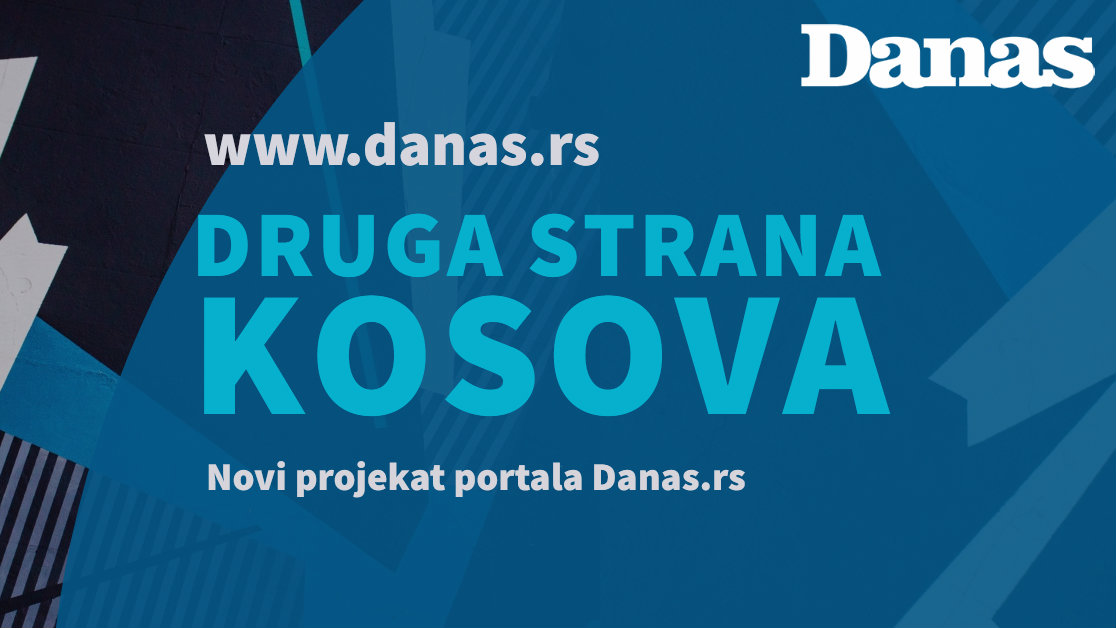
- Questions asked by Sonja Biserko, the President of the Helsinki Committee for human rights in Serbia:
How does society react to your activities?
– It depends on the performance that we give. The performances which deal with social problems such as water shortages or domestic violence are supported by most of the people, but when we give performances concerning LGBTQI problems, we get a lot of negative comments and due to the kiss for Valentine’s Day, we received more than hundred threats from different people who got irritated with the picture.
Are your activities supported by the government?
– No, they are not. Actually, we have never applied for any kind of support, but perhaps we would get it.
Are women from the Serbian community included in your programs?
– Haveit consists of two pairs of sisters Vesa and Hana, Lola and Alketa. We function as an artistic collective and we do not have any program or schedule. The collective as such is a closed group. However, our practice is open for the collaboration with art and culture institutions, NGOs, and other artists, and we often do so. There would be no reason for not collaborating with the Serbian community, and we worked together in the past. However, we have never staged any performance together.
- Questions posted by the social networks followers:
In your opinion, who creates an artificial war between Albanians and Serbs, and why?
– We do agree that people to their very core do not hate each other or are at war; in fact, we’ve often witnessed and have been part of programs where the cooperation with Serbs has been the superb one.
However, it must be noted that the current state of affairs isn’t that much artifical. For instance, Serbian state has been working all the time on creating problems for Kosovo state. This isn’t just politics at some higher level, it affects our day-to-day life. When we witness these attempts, such as huge investments in foreign relations to hinder the recognition of Kosovo, investments that could otherwise be made in the domain of education, culture, schools, and actually could impact your way of life for the better, we are reminded of the terrible past and we wonder if things are really in any way different.
Do you have Serbian friends?
– Yes, we do. When we were children, we used to play together in the neighbourhood. We have friends who live in Belgrade, Banja Luka etc.
What inspires you to create art?
– Our daily life. What we do is art out of necessity.
Pratite nas na našoj Facebook i Instagram stranici, ali i na X nalogu. Pretplatite se na PDF izdanje lista Danas.



